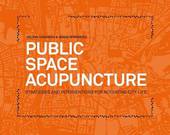
|
Public Space Acupuncture: Strategies and Interventions for Activating City Life
Paperback / softback
Main Details
| Title |
Public Space Acupuncture: Strategies and Interventions for Activating City Life
|
| Authors and Contributors |
Edited by Helena Casanova
|
|
Edited by Jesus Hernandez
|
| Physical Properties |
| Format:Paperback / softback | | Pages:324 | | Dimensions(mm): Height 239,Width 189 |
|
| ISBN/Barcode |
9780989331708
|
| Classifications | Dewey:711 |
|---|
| Audience | |
|---|
| Edition |
English ed.
|
|
Publishing Details |
| Publisher |
ActarD Inc
|
| Imprint |
ActarD Inc
|
| Publication Date |
12 January 2016 |
| Publication Country |
Spain
|
Description
As the financial crisis deepens in many European countries and the construction sector remains in a slump, many plans for urban regeneration have been shelved. Cities are cutting their spending on large public works, so the time is ripe for low-cost strategies that have a positive impact on the urban habitat. One such strategy is Public Space Acupuncture, in which independent, but coordinated small interventions help regenerate urban public space and city life. It is based on Zygmunt Bauman's characterization of the current era as Liquid Modernity. With works on Switzerland, The Netherlands, Austria, China, Germany, Spain, Albania, Denmark, Hungary, Slovakia, Latvia and Korea.
Author Biography
HELENA CASANOVA 1967Born in Madrid 1989-1999Collaboration with several offices in the fields of architecture and urban planning in Spain and Germany 1997Architect. ETSAM (Technical School of Architecture, Madrid) 1999-2000Collaboration with 'West 8, landscape architects and urban planners'. Rotterdam 2000Member of the SBA, Association of Dutch Architects 2000-2001Collaboration with 'Neutelings-Riedijk architecten'. Rotterdam 2001Established with Jes s Hern ndez, CASANOVA+HERNANDEZ ARCHITECTS, Rotterdam 2002-2005Architectural Projects lecturer at AvB Arnhem, AvB Amsterdam and TU Delft 2002-Guest lecturer (architectural design) and tutor final projects at AvB Rotterdam 2009-Member commission 'Architecture, Research and Design' of the Stimuleringsfonds voor Architectuur (SfA) 2011-Guest professor at Berlage Institute in Rotterdam. Research & design studio "Public Space Acupuncture" JESUS HERNANDEZ 1967Born in Madrid 1989-1999Collaboration with several offices in the fields of architecture, urban planning and industrial design in Spain 1998Architect, urban planner and landscape architect. ETSAM (Technical School of Architecture, Madrid) 1999-2000Collaboration with 'West 8, landscape architects and urban planners'. Rotterdam 2000-Member of the SBA, Association of Dutch Architects and COAM, Association of architects of Madrid 2000-2001Collaboration with 'Claus en Kaan architecten'. Rotterdam 2001Established with Helena Casanova, CASANOVA+HERNANDEZ ARCHITECTS, Rotterdam 2002-2005Guest lecturer (architectural design) at AvB Arnhem, AvB Amsterdam and TU Delft 2002-Guest lecturer (architectural design) at AvB Rotterdam 2009-Member of the AEP, Association of Spanish Landscape Architects (association integrated in the EFLA) 2011-Guest professor at Berlage Institute in Rotterdam. Research & design studio "Public Space Acupuncture"
Reviews"The book is rich fodder for anyone interested in a whole-system approach to activating city life. At turns, it is helpful and dense, insightful if sometimes a bit academic. Ultimately, the book is a useful tool for anyone invested in the idea of transforming a city in this unique, big-picture way." --Laine Bergeson, Public Art Review "An inherently fascinating, informed and informative read, 'Public Space Acupuncture' is impressively well written, organized and present. 'Public Space Acupuncture' is strongly recommended for professional and academic Architectural Studies reference collections and supplemental studies reading lists." --John Burroughs, The Midwest Book Review "Public space acupuncture is a set of alternative urban strategies based on coordinated catalytic interventions with the aim of activating the use of public space and balancing or revitalizing urban life. Nine case studies and 21 test cases analyze the key factors in these innovation strategies, including citizen participation and short-term and flexible processes developed through a wide variety of temporary low-cost, mutating, nomadic or artistic interventions. Among the cases are Lausanne Jardins in Switzerland, Sandleiten in Vienna, and the Wii playground in Amsterdam." --Eithne O'Leyne, Editor, ProtoView
|